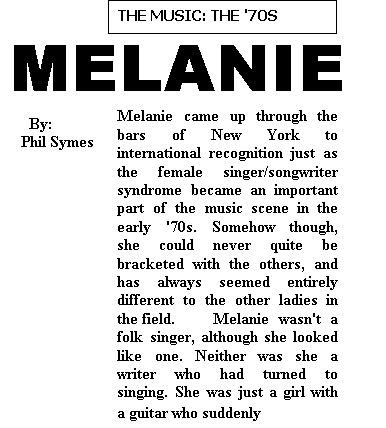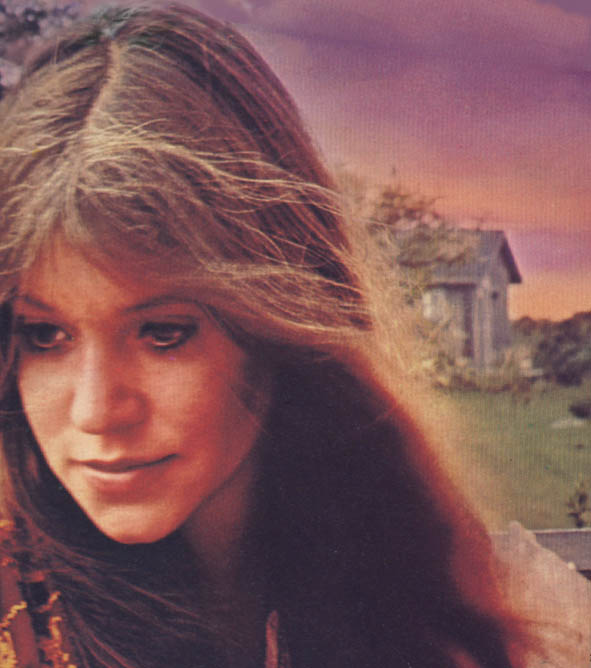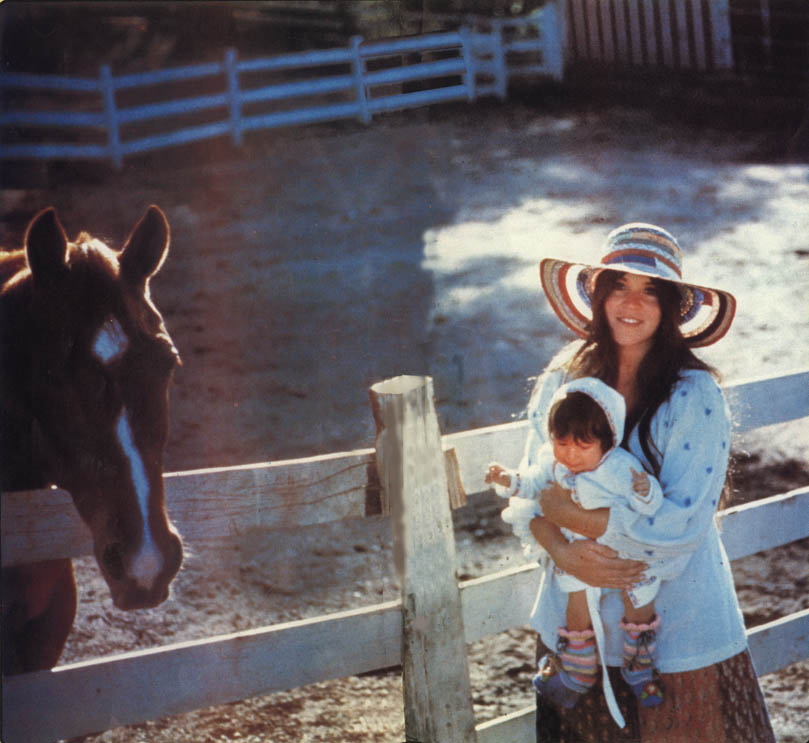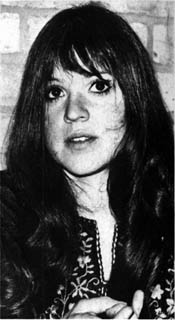Story of Pop (Part 37)
The girl who first
made it big with her own great version of Ruby Tuesday


|
turned up singing at festivals . . . and became a cult. Her image was that of a young girl caught up in something she didn't quite understand. Despite the naive exterior, Melanie's voice ranges from a gentle, almost crying sound to a harsh near-scream. In between, her bluesy tones cover the ground so effectively that the question is posed of how she would tackle some Billie Holiday material. She sings songs about her life and environment, and sometimes sets music to children's poems like 'Christopher Robin' and 'Alexander Beetle'. She's been called a female Peter Pan, and - a trifle loosely - a female Bob Dylan. It has become ritual for fans to pack out her concerts, call out for their favourite songs, and crowd the stage to be near her. They refuse to let her leave the stage. "At one concert I did at Carnegie Hall, the people rushed up to the stage as I was leaving and some were crying. One girl was pleading, 'Melanie, p/ease don't go'. It was really frightening and I started crying." The reason for
such devotion from fans can only be Melanie's gift of communication. It
started with songs like 'Beautiful People' and 'Close To It All', songs that
were around during the 1970 'spirit of brotherhood' period, the period that
followed the legendary Woodstock festival. And that same feeling, although
not generally still so prevalent, has thrived ever since in Melanie's songs
and concerts. 'Close To It All' has been singled out by her fans as the theme
of Melanie's live performances, and as soon as she appears her fans swarm on
the stage, at her feet, and gaze in awe as she goes through her set. They
sing aloud, and they raise their burning candles. |
|
|
Stage Fears Without all those people, Melanie would be lost. She leans on her audience for her strength in performing. "I have fears about going on stage. I get violently nervous and I feel as though I'm going to be sick. But as soon as I have the audience with me the music just flows out of me. If they didn't call out for songs I don't know what I'd do. I never know what I'm going to do when I go out there. It all depends on them." Whenever she comes on stage, Melanie always looks like a hopeful singer at her first audition. The self-consciousness shows. She tilts her head and she bites her bottom lip, and as she sits alone with, just her guitar she looks frighteningly vulnerable. As soon as she starts, though, she enraptures her audience, and often holds them for anything up to three hours. Melanie purposely doesn't use musicians on stage: "It wouldn't be fair on them - I change around so much they wouldn't be able to keep up with me. And I wouldn't want the whole thing to be rehearsed, otherwise it loses any kind of spontaneity that might have been there." Performing is an important outlet for Melanie. "I have to project the words of my songs, so I really have to feel them. If at any time I find myself thinking of something else during a song I stop doing it. You can get in a rut - make the same expressions and become very mechanical - I've seen it happen to people. But if it became mechanical to me I'd stop working." Melanie became a professional singer purely accidentally. She'd always sung - her mother, an Italian jazz-singer who used to sing with Sam the Man Taylor, was always singing around the house, and Melanie used to imitate her. She sang in school, but always thought she was going to be an actress so, at 17, she went to acting school and emerged two years later with a degree from the American Academy of Dramatic Art. But there was little work going for a young actress at the time, so Melanie spent the next two years playing her guitar in bars around New York. Then she heard that auditions were being held for a part in Dark Side Of The Moon. She went along hoping for a part, stumbled into the wrong office, met some producers who saw her guitar and asked her if she could sing . . . and went home with a contract for her mother to sign. After this
amazing series of events, no one at that company took much notice of Melanie
once she had signed herself to them. No one, that is, except Peter Schekeryk,
a producer who persuaded her to leave and move on to Columbia. And when
Columbia wouldn't allow her to make an album, he moved her to Buddah . . .
where she first found success. Appropriately enough, Schekeryk became
Melanie's manager and producer, and later her husband. |
|
|
Singing With The World Meanwhile, Melanie had some local success with her first releases on Buddah, particularly 'Beautiful People'; but her first major breakthrough came with 'Candles In The Rain', a song she recorded with vocal backing by a gospel group, the Edwin Hawkins Singers. The single was successful internationally, and brought Melanie in a Gold disc for both the single and the album. The sleeve notes on the 'Candles In The Rain' album were an illuminating dedication to the Hawkins Singers from Melanie: 'Dear Edwin Hawkins Singers - I was so afraid I would always have to sing alone. Thanks to all of you I got my chance to sing with the whole world.' The 'Candles In The Rain' album contained the tune that really broke Melanie in Britain. It was her version of the Stones' oldie, 'Ruby Tuesday'. Where the single of 'Candles In The Rain' had struggled somewhat, 'Ruby Tuesday', released late in 1970, quickly became a Top 10 record. Then, early in 1971, one of Britain's pop papers announced their reader poll results for 1970 . . . Melanie was 'Top World Female Singer'. She won the award again in 1972, proving that once established she maintained her following. But Melanie's
recording career hasn't been without its difficulties. Early in 1971 she
began to express discontent with the way she was being treated by her record
company: "I have this contract which says they can call for as many
albums as they like. They've been calling out . . . in fact they've been
calling so much they've started inventing albums. They've repackaged my first
album and put out another one called 'The Best Of Melanie', which I hope no
one buys." After the 'Candles In The Rain' album, in fact, Buddah
released two more official follow-up albums, 'Leftover Wine' - recorded live
at, Carnegie Hall - and 'Good Book'. They also issued several compilation
albums, and reserviced Melanie's two very first albums, 'Born To Be' and
'Affectionately Melanie'. By this time Melanie and Peter were thinking about
moving on, but they wanted more control over their product. So, in 1972,
Peter set up Neighborhood Records, his own label for Melanie plus any other
artists he wanted to work on. |
|
|
|
|
|
Melanie at
home, with daughter, Leilah. |
|
|
The change seemed to do Melanie and Peter a world of good. The first album she came up with for the label, 'Gather Me', was another Gold Disc, and from it came a hit single, 'Brand New Key', plus two other hits, 'Someday I'll Be A Farmer' and 'Ring The Living Bell'. Melanie said she felt a lot more relaxed with the new set-up, and felt it was showing in her songs. Certainly 'Brand New Key' was in a much lighter vein than anything on the previous Buddah album, 'Good Book', which seemed laced with somewhat bitter songs directed at the company: 'Well you know that I'm not a gambler But I'm being gambled on They put in a nickel and l sing a little song' ('Nickel Song') Melanie's songs have always appeared to be mirrors of her own feelings. This is particularly evident in some of the first songs she wrote, songs like 'Mama Mama', written when she was 15: 'Sometimes l fee/ my life has
come and gone I'm living in this world but I'm only lookin' on' The song reflects the loneliness and anguish Melanie went through at the time. Not surprisingly, she says that school was 'the time when things started going pretty bad'. Before school, however, Melanie remembers being very happy. Her father was Ukrainian and her mother Italian, she had one sister and they lived all together with an uncle and Ukrainian grandmother after whom she is named - in one small apartment in the Queens area of Astoria, New York. Astoria was a small Italian neighbourhood where the people tended to stick together, and she remembers it as 'nice and friendly with a real home town atmosphere'. She recalls most of those years as being very happy. She loved watching her mother get dressed to go and sing in clubs in the area, and through this developed an interest in show-biz. Then, when she went to school, things went all wrong. She had a hard time getting on with people. "I was very much alone; I spent all my time writing, playing, singing and falling in love with everybody. I spent many hours in love."
And I really loved John l really loved Alfie And l almost loved Tom'
|
|
|
Writing songs was her only way of releasing her feelings, and she says even today she finds it much easier to speak her mind through her songs: "I write songs to say things to people I couldn't tell them otherwise. If someone upsets me or annoys me I won't say anything to them, I'll write it down . . ." There was the time Melanie was at a recording session and got frustrated by the way the musicians were handling her songs. Later she wrote 'Look What They've Done To My Song Ma', a beautiful, pleading cry of remorse that was a hit for the New Seekers. During high school days Melanie's family moved to New Jersey, and she had to duly change schools. She hoped it might be a change for the better, but - alas - things were worse in New Jersey. There she was looked upon as some kind of 'freak'. "It was really bad, people in the town were afraid of anyone who was different; anyone who showed signs of individuality was automatically considered strange. I had been wearing Indian fringe boots for a long time anal thought they were wonderful. The people at school had never seen anything like it before in their lives, and the way they looked at me was unbearable. I was sent to the school psychologist. Maybe if I'd gone to high school in New York it wouldn't have been so bad." |
|
|
As a result,
she ran away to Los Angeles where she was found by the police and brought
back home. Since those days the things that Melanie was analysed for in
school have become her character. She wears heavy patch velvet dresses, still
wears Indian boots, and has never been seen with a hemline above the ankle.
She eats vegetarian, and even sings songs on stage about not eating animals: A little bit of whole meal ('I Don't Eat Animals') Nowadays, Melanie lives in a house in New Jersey that she had specially built for her, with her husband, baby and her animals. And she still gets strange looks from her neighbours. "I asked the builder to build me a ginger-bread, house - with lots of candy." It was built around the style of a fairy-tale house with low beams and brick floors . . . and stands at the edge of a forest with pine trees out front. In spring, she says, it's very' beautiful. Her menagerie there consists of a goat, a St. Bernard, a sheepdog, two sheep, and a spaniel called Roadie . . . who goes on tour with her. "It's a fairly residential area, and we've got all these animals walking around the garden. The people don't know what to make of it." Despite this, Melanie also has an apartment on Central Park in New York, and although she loves the country she's basically a city girl at heart. She finds it offers her a lot of inspiration far her songs, like 'Uptown And Down' and 'Citiest People'. "I like to go camping. I like to have a couple of days away from the city - but I always have to go back. I think the city is where all the changes begin, and I also feel It is the most desperate place. If you're aiming for peace of mind, the city is not the place to go. But if you want life then the city is, the place. I'm always getting new ideas from the buildings and the people." Melanie loves to go shopping in the city, and people can't believe it when they recognize her in Woolworths. "People come up to me and say you sure look a lot like Melanie, and I say 'a lot of people say that'. Otherwise they don't say anything, but I can sense they're talking about me: People just don't expect to meet you in places like that." There was the
time when Melanie did a benefit concert for college students in Stoke‑on‑Trent
in England's Midlands. She did four encores and three hours in total, but
that still wasn't enough. As she left the hall at midnight a group of fans
clutching programmes and album sleeves asked her why she didn't sing their
favourite, 'Ruby Tuesday'. "You wanna hear it," she asked.
"Okay." And she picked up her guitar there in the street at
midnight and sang it just for them .... |
|
Back
to Chronology
Back to Melanie

